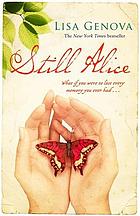Alzheimer's Disease is horrible and scary and horrible. It's I think a little less horrible and scary and horrible as depicted in this novel by neuroscientist Lisa Genova. The narrator is an extremely intelligent and even-tempered Harvard professor with early onset Alzheimer's. While reading the page turner in about a day, I was often moved to tears. The originality of the premise—the telling of the story from the point of view of the patient—and the convincingness with which Genova depicts it are unmistakable. However, do you see a however coming?
Everyone in the book is too nice. Some would argue that the husband is a little selfish, but he doesn't seem to be dangerously abusive or neglectful. And Alice's complaisance while she's losing it seems a little unrealistic. Unlike the author I've only been up close and personal with one Alzheimer's patient, so my sample is a little small, but hoo boy is the patient I know angry! Alice exhibits very little denial, shame, or rage.
The questions in the Readers Club Guide, written by Dr. Genova, focus primarily on the disease. I would have liked to have seen some that get at the book more as a piece of literature. For example, the gender issues are potentially meaty. The son is nearly invisible, while his sisters are deeply engaged in their mother's care. Alice posits that should their roles have been reversed that she would have cared for her husband differently than he is for her. She also muses about how his career would have fared had he been the bearer of their three children instead of she.
What I'm getting at is that while Still Alice is an important and compelling book, I think Genova could have had—and achieved—higher literary aspirations. She self-published the first time around, and so perhaps will benefit from big city editing on her next novel. Hooray for her self-publishing success story, though!
